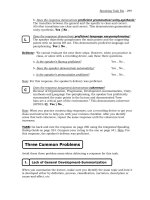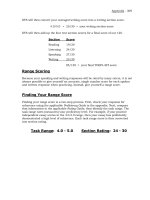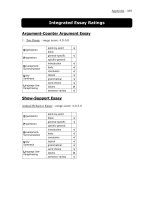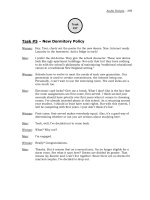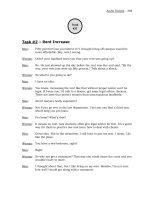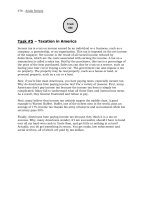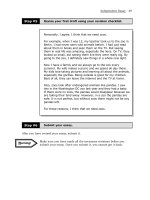Tài liệu Speaking and Writing Strategies for the TOEFL iBT part 19 pptx
Bạn đang xem bản rút gọn của tài liệu. Xem và tải ngay bản đầy đủ của tài liệu tại đây (273 KB, 10 trang )
Speaking Task One - 169
When the narrator stops reading the prompt, a countdown clock will appear on
your screen. It will count down (15, 14, 13 ). You will have 15 seconds to develop
your response. Remember to use personal experience examples to support your
opinion.
When the countdown clock reaches zero, you will hear a “Beep!” Look at your
note map. Start speaking. State your opinion first, then your example. End with
your conclusion.
Check this sample practice response for Coherence using the proficiency checklist.
Does the response demonstrate organization?
The speaker uses neither deduction nor induction. This demonstrates a
lack of organization. Yes _ No X
Does the response demonstrate progression?
Because the speaker does not use a method of organization, the ideas do
not progress. This demonstrates a lack of progression. Yes _ No X
a. Does the introduction demonstrate development?
The speaker says, “I agree.” This is not an opinion. It is a fact. It is not
arguable. This demonstrates a lack of introduction development.
Yes _ No X
I agree.
For example, when I was a high school student, I had
a job at a bookstore. It was, you know, fun. You should do it.
You will really like it too. I guarantee.
So that’s all I have to say. I think it’s clear what I think.
Words: 49
G = personally agree
TiC = for example bookstore
C = for those reasons agree
Develop ideas (15 seconds).
Step #3
Speak (45 seconds).
Step #4
O
P
D
170 - Speaking Task One e
b. Does the body demonstrate development?
The speaker does not develop a specific example. This demonstrates a
lack of body development. Yes _ No X
c. Does the conclusion demonstrate development?
The speaker does not restate his opinion at the end. This demonstrates a
lack of conclusion development. Yes _ No X
a. Does the response demonstrate topical unity?
The speaker focuses on the topic of working in high school. This
demonstrates topical unity. Yes √ No _
b. Does the response demonstrate grammatical unity?
The transitions (TiC) and (TO) are correct. This demonstrates grammatical
unity. Yes √ No _
a. Does the speaker demonstrate proficient language use?
There are no mistakes in syntax; however, the speaker uses only simple
sentences. There are no idioms. There is no advanced vocabularly. This
demonstrates a lack of language use. Yes _ No X
Note: We cannot evaluate the next three steps: delivery. However, when you
practice in class, or alone with a recording device, ask these three questions.
a. Is the speaker’s fluency proficient? Yes _ No _
b. Does the speaker demonstrate automaticity? Yes _ No _
c. Is the speaker’s pronunciation proficient? Yes _ No _
Note: For this response, the speaker’s delivery was proficient.
Does the response (argument) demonstrate coherence?
The speaker does not demonstrate a method of organization. Because
there is no method of organization, the ideas do not progress or develop.
Because the ideas do not progress or develop, there is no demonstration of
language use. The result is a serious lack of coherence (OPDUL=C
). Yes _
No X
According to the Independent Speaking Rating Guide (page 320), this response will
score in the 1.5-2.0 range. If you (the speaker) want a higher score, you must
revise those parts of OPDUL=C
that received an X. The Xs are your revision
checklist. By identifying problem areas, you can focus on revising them when you
practice. This, in turn, will make you test ready. On the next page, read the same
response revised.
U
L
C
Speaking Task One - 171
TASK: Rate this response using the Independent Speaking Rating Guide on page
320. Compare your rating to the one on page 340. Note
: For this response, the
speaker’s delivery was proficient.
Rhetorical strategies demonstrate topic development (OPDUL=C) and language use
(OPDUL
=C). These, in turn, demonstrate coherence (OPDUL=C). The work-and-
high-school essay demonstrates a variety of rhetorical strategies, including:
the writer working in a bookstore in Budapest, Hungary;
the writer’s personal story of working in a bookstore;
English bookstore…worked every Saturday and Sunday
and sometimes at night…I loved it;
- work at the bookstore (cause) make money (effect);
- work at the bookstore (cause) “kill two birds with one
stone” (effect);
- work at bookstore (cause) learn conversational English
(effect);
- work at the bookstore (cause) no longer depend on
parents for money (effect);
Personally, I think that high school students should work while
going to school.
For example, when I was a high school student, I had a job at
an English bookstore in Budapest, Hungary. I worked every
Saturday and Sunday, and sometimes at night during the
week. I loved it because I was always meeting foreigners who
spoke English. By helping them find books, I was able to
practice my English. It was great because at school, I only
learned grammar from books, but at the bookstore I was
learning conversational English. Not only that but I made
money for myself. This helped me because I didn’t always have
to ask my parents for money for books and other things. As
you can see, by working at the bookstore I killed two birds with
one stone.
In conclusion, I believe that all high school students should
work part-time during high school.
Words: 150
Rhetorical Strategies
illustration
narration
description
cause-effect
172 - Speaking Task One e
learn English grammar at high school v. learn
conversational English at the bookstore.
Let’s map out another single-question response. Remember to use G+TiC=C and
the four steps to demonstrate OPDUL=C
in your response.
Prompt People are living longer. Why? Develop your position
using examples and reasons.
G = personally
TiC = for example
C = for those reasons
G = personally better care
TiC = for example grandfather
C = for those reasons better care
compare-contrast
Basic Response: Step-by-Step
3.
Make a G+TiC=C note map; include transitions.
Step #1
Read the prompt.
Step #2
Develop ideas (15 seconds).
Step #3
Speaking Task One - 173
TASK: Check this response for coherence using the Independent Speaking
Proficiency Checklist on page 318, then rate it using the Independent Speaking
Rating Guide on page 320. Compare your rating to the one on page 340. Note
: For
this response, the speaker’s delivery was proficient.
Do I always have to say “For example” when I start to give my example?
No. “For example” is simply there to remind you that you need a transition
after you state your opinion.
Below, you will find synonymous examples for “for example.” Remember: You can
use these examples in your independent essay as well.
Personally, I contend that people are living longer because
they are taking better care of themselves.
For example, my grandfather is eighty. When he was
younger, he used to smoke and drink a lot. Also, he never ate
very well. Then, when he was fifty, he had heart attack. He
was in the hospital for a long time. The doctor told him he
should stop smoking and drinking, and start eating better.
That’s what my grandfather did. Now, he doesn’t drink or
smoke anymore. Also, he eats lots of healthy food like salads
and fish, and he exercises every day. As a result, he feels
much better than before and has lots more energy.
By changing his lifestyle, my grandfather is definitely going to
live longer because he is taking better care of himself.
Words: 134
Personally, I contend that people are living longer because
they are taking better care of themselves.
For example, my grandfather…
A good example is my grandfather…
An excellent example is my grandfather…
A good illustration is my eighty-year-old grandfather…
An illustration to support my opinion is my grandfather
My grandfather, who is eighty, is an excellent illustration.
Speak (45 seconds).
Step #4
Q
A
174 - Speaking Task One e
Read the following prompt and the response.
This response contains four common problems you should avoid on test day.
Read the speaker’s opinion once again.
Prompt In your view, what was the greatest invention of the
twentieth century? Why? Give examples and reasons
to support your argument.
Personally, I believe that the greatest invention of the
twentieth century was women developing and winning many
special rights they never had before from countries that didn’t
care about them, and I believe this is a good thing for all
women.
For example, women were very successful. They did a lot of
very important things that changed their lives. They won many
rights they never had before.
Women winning rights was the greatest invention of the
twentieth century because it helped them so much.
Words: 84
Personally, I believe that the greatest invention of the
twentieth century was women developing and winning many
special rights they never had before from countries that didn’t
care about them and I believe this is a good thing for all
women.
Overstated Opinion
1.
Four Common Problems
Speaking Task One - 175
This test-taker is overstating her opinion. To overstate means to say too much.
Avoid overstating your opinion by delivering it in one concise sentence, for
example:
Read the supporting illustration from the same response.
In this body paragraph, does the test-taker develop a specific personal example to
support her opinion? Is there a cause-and-effect relationship providing a reason?
No. Because there is a lack of topic development (OPD
UL=C), there is a lack of
coherence (OPDUL=C
). This will result in a lower score.
Look at the following maps. The supporting example in Map A lacks development.
In contrast, Map B has a supporting example that is well-developed. If you want a
high score, your response should look like Map B.
general general
general specific
general general
Lack of development, especially in the body paragraph(s), is a big
reason why test-takers score low on independent Speaking Task #1.
Personally, I believe that the greatest invention of the
twentieth century was women winning many rights.
For example, women were very successful. They did a lot of
very important things that changed their lives. They won many
rights they never had before.
Lack of Topic Development
2.
Map A
Map B
Warning!!
176 - Speaking Task One e
Why was this test-taker unable to develop a supporting example for women’s
rights? Because she was trying to speak objectively. In her own language, she knew
what she wanted to say objectively, but she couldn’t translate it into objective
English in 45 seconds. In the end, she became frustrated and lost focus. As a
result, she hesitated too much. This demonstrated a lack of proficient language use
(OPDUL
=C), specifically fluency and automaticity. The result was a lack of
coherence (OPDUL=C
).
Avoid “big” topics. Don’t talk about Einstein or Bill Gates. Talk
subjectively. Talk about you
. When you talk about your own
experience, you are more confident. Because you are more confident,
you make fewer mistakes. Fewer mistakes = increased language use
proficiency = greater coherence = a higher score.
Read the prompt once again. Notice that the topic in the prompt is “the greatest
invention of the twentieth century.” This test-taker, however, talks about “women’s
rights.” Women’s rights is not an invention. It is a political idea. An invention, in
this context, means an original material idea, i.e., Marcian Edward Hoff, Jr.
inventing the microprocessor.
Carefully read the prompt. Make sure you understand it before you
respond. Make sure you are “on topic” (talking about the topic in the
prompt) not “off topic” (talking about a different topic), for example:
Personally, I think that the car was the greatest invention of
the twentieth century.
For example, I am from Turkey. I remember my mother and
father telling me how they had a horse before they had a car.
The horse was very important because it did everything, such
as work in the fields and take vegetables to market. Using a
horse, though, was very slow. Everything took so much time.
But then my father bought a car and everything changed
completely. He could go places more quickly and he could take
more vegetables to market. Best of all, he took my mother to
the hospital to have me.
In conclusion, I think that for me and my family, the greatest
invention of the twentieth century was the car.
Words: 128
3.
Remember!
Off Topic Response
4.
Lack of Subjectivity
Remember!
Speaking Task One - 177
TASK: Check the previous response for coherence using the Independent Speaking
Proficiency Checklist on page 318, then rate it using the Independent Speaking
Rating Guide on page 320. Compare your rating to the one in the answer key on
page 340. Note
: For this response, the speaker’s delivery was proficient.
Listed below are reasons why your response is longer than 45 seconds.
Reason #1 Your opinion is too long.
Solution 1. Make your opinion shorter.
2. State your opinion in one concise sentence.
3. State your opinion in 5 seconds or less.
4. Speak faster; try not to hesitate.
Reason #2 When the clock starts, you are not speaking right away. As a result,
you are losing valuable seconds at the start.
Solution Start speaking right after the beep. Remember: The speaking tasks
come up fast. Be ready for them
Reason #3 You are being too careful. When you are too careful, you slow down to
pronounce correctly. When you slow down, you waste time. You also
decrease fluency and automaticity.
Solution 1. Speak at a natural pace.
2. Record your voice, then play it back. You will know if you are
speaking too slowly. If so, speak faster.
Reason #4 You are pausing or hesitating too much. Record your voice and
play it back. You will soon know if you are pausing or hesitating
too much. Pausing and hesitating wastes time. Pausing and
hesitating will also decrease fluency and automaticity.
Solution 1. Avoid pauses; try not to hesitate.
2. Practice reading sample responses until you speak confidently
and at the right speed.
3. Ask a native speaker to demonstrate the right speed.
Reason #5 You are pausing and/or hesitating too much because you have not
memorized G+TiC=C.
Solution 1. Memorize G+TiC=C.
2. Practice reading sample responses.
Help! – My Response is Too Long!
178 - Speaking Task One e
Reason #6 Your supporting illustration (TiC) contains too much information.
Solution 1. Do not include information that is not important or off topic.
2. Develop one example only (G+TiC=C). Remember: One well-
developed example is better than two examples that lack
development.
Reason #7 Your conclusion is too long.
Solution 1. State your conclusion in five seconds or less.
2. Simply repeat your opinion.
Reason #8 The clock makes you so nervous you can’t speak.
Solution 1. Do not time yourself when you practice. Just speak. When you
are more confident, time yourself.
Listed below are reasons why your response is too short.
Reason #1 You are nervous. When you are nervous, you speak too fast and
finish too soon.
Solution 1. Record your voice and play it back. You will soon know if you are
speaking too fast. If so, slow down.
Reason #2 Your supporting illustration is too short. If your example is too short,
it will lack development.
Solution 1. Include more details when you develop your supporting example.
Identify all place names and people names. Remember: Be
specific. If you studied mechanical engineering at Tsinghua
University in China from 2000 to 2003, say, “I studied mechanical
engineering at Tsinghua University in China from 2000 to 2003.”
Reason #3 You speak, then suddenly stop because you are shy or afraid, or
feel stupid.
Solution 1. Practice reading into a recording device. Read an English
magazine article or a book while recording. This will help you
develop confidence speaking into a microphone.
2. Take an ESL class to develop your speaking skills and your
confidence.
3. Practice. Practice. Practice.
Help! – My Response is Too Short!
